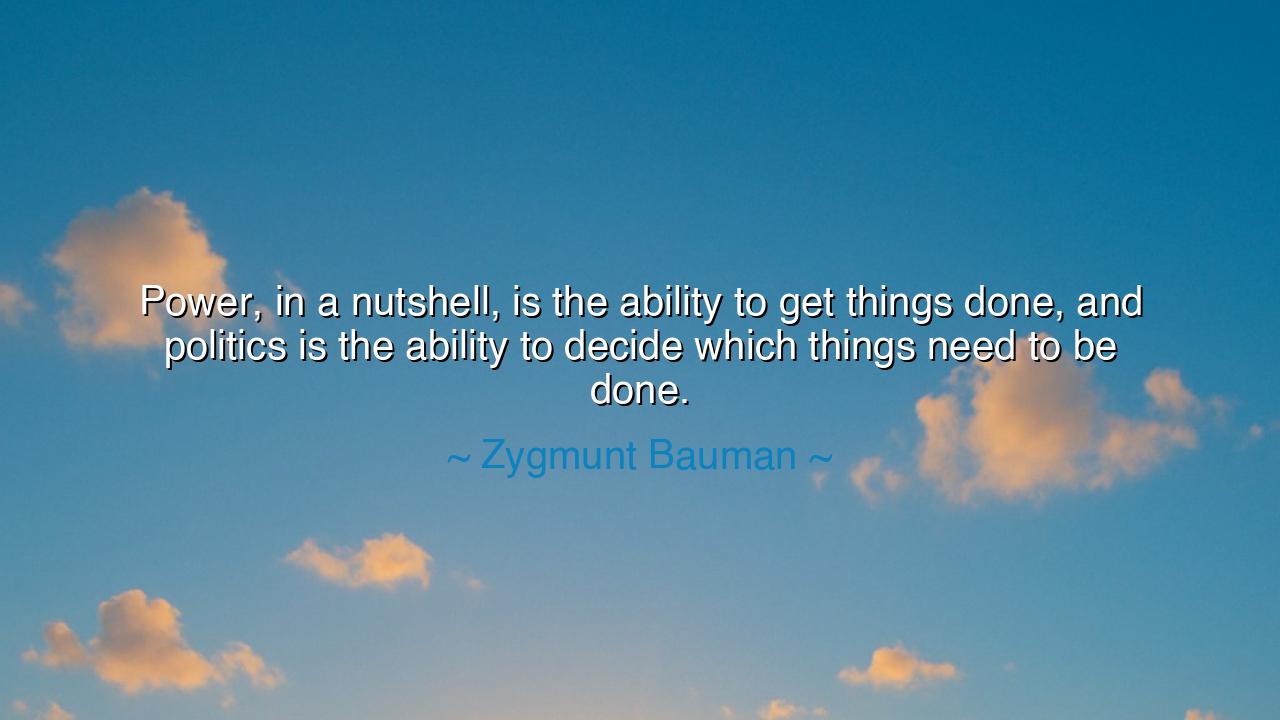
Power, in a nutshell, is the ability to get things done, and
Power, in a nutshell, is the ability to get things done, and politics is the ability to decide which things need to be done.






Hear, O children of wisdom, the voice of Zygmunt Bauman, philosopher of liquid modernity, who declared: “Power, in a nutshell, is the ability to get things done, and politics is the ability to decide which things need to be done.” In this utterance, he cuts through the confusion of words and reveals the twofold mystery of human governance: the strength to act, and the wisdom to choose. For one without the other is folly—power without direction becomes tyranny, and politics without power becomes emptiness.
For power is the force of action, the might that turns vision into reality. It is armies moved, roads built, laws enforced, and the will of rulers made flesh. Yet politics is the compass, the voice of deliberation that asks: What should we do? Whose needs matter most? Without politics, power rushes blindly like a river without banks, flooding and destroying. Without power, politics is only talk, like seeds cast upon stone. Only when both unite can society truly live.
History offers us many mirrors of this truth. Consider Franklin Delano Roosevelt during the Great Depression. He had both the political wisdom to see that the people required relief, reform, and recovery, and the power of government to build the New Deal. Had he possessed power alone, he might have built monuments to vanity. Had he possessed politics without power, his ideas would have remained words on parchment. But by joining power and politics, he gave hope to millions and reshaped a nation.
Contrast this with the fall of the French monarchy. Louis XVI, though clothed in immense power, lacked the political wisdom to see what needed to be done for his starving people. He clung to old privileges and ignored the cries of the poor. Thus, his power became meaningless, swept away by revolution. From this we learn that to act without wisdom is destruction, but to decide without action is futility.
Therefore, let this lesson endure: power and politics must walk hand in hand. To govern well is not merely to act, nor merely to deliberate, but to join strength with vision. Bauman’s words are a torch for rulers and peoples alike, reminding us that the true art of leadership is not only to possess might, but to know which battles are worthy of fighting, and which labors are worthy of our hands.






TVVo Thuy Vy
Bauman’s description of power as the ability to get things done resonates with me, but I’m curious about the balance between efficiency and fairness. Politics, as he describes it, is about deciding which things should be done, but can politicians sometimes focus too much on what seems easiest or most beneficial for their career rather than the most necessary for society? How do we make sure that political decisions serve the greater good, not just the political agenda?
KNDUONG THU KIM NGAN
I appreciate Bauman's definition of power and politics, as it speaks to the practical nature of governance. However, it raises an important question about who gets to decide which things need to be done. When we live in a democracy, should these decisions be left to elected representatives alone, or should there be greater public participation in the decision-making process? How do we ensure that power is not concentrated in the hands of a few, but distributed more fairly?
LHLinh Ha
Bauman’s take on power and politics is an insightful one. If power is about execution and politics is about choosing what to do, it suggests a clear division of labor. But I wonder, how often do political decisions actually reflect what is needed in society versus what is convenient for those in power? Does this lead to a disconnect between public needs and political agendas, and if so, how do we bridge that gap?
VVVy Vie
Bauman’s statement about power being about getting things done makes it seem like the function of power is more practical than idealistic. But when you tie it to politics, it seems that power is also about navigating the complex dynamics of what needs to be done. Can we really trust that politicians will always make the right decisions, or does this system lead to power being wielded irresponsibly? How do we hold those in power accountable for their decisions?
HGPhạm Huong Giang
Zygmunt Bauman’s distinction between power and politics is an interesting one. He places the decision-making authority squarely in the realm of politics, but what happens when those in power make decisions that benefit only a select few? Does this mean that politics, by nature, is often about excluding certain groups from the process? How do we address this imbalance and ensure that political decisions reflect the needs of all citizens, not just those in power?